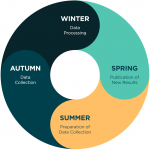The Aarresaari network actively monitors the integration of academic graduates into working life. Since 2004 have almost 100 000 graduates taken part in the survey. The latest results can be found on the Latest Results page.
The process of master’s degree career monitoring
The target group of career monitoring comprises all persons who have graduated with either a second cycle university degree or a so-called concluding first cycle university degree five years earlier. The target group is generally referred to as masters.
Implementation
The career monitoring group of Aarresaari coordinates the implementation of career monitoring surveys on a national level. The universities jointly decide on the questionnaire content, the time of data collection and the method of implementation. This ensures that the materials collected by different universities are intercomparable and that they can be compiled on a national level. However, each university is ultimately responsible for its own query and for submitting it to their own alumni.
The survey is implemented in cooperation with the statistics research service of the University of Tampere, TUPA, whose tasks include the coordination of data collection and the storage of printed forms, as well as with CSC, whose ARVO query tool is used in the implementation of the electronic form.
What is asked from graduates?
The nationwide master’s degree career monitoring survey, which is implemented jointly by the universities, collects information on the quality and relevance of the working life integration of people with academic degrees, on the development of their career and on their satisfaction with their completed degree. The survey provides up-to-date information for quality assurance and control work at universities, and for research use.
Graduates are asked about their satisfaction with their degree, about their overall career and their current situation. In addition, the survey aims to examine the quality of graduates’ employment, the competence required in their work and the development of their competence during university studies. The survey contains questions related to the funding model of higher education institutions. The aim of these questions is to examine the realisation of high-quality employment (for which the degree is of relevance). Read more on the funding model below.
Learn about the contents of master’s degree career monitoring in autumn 2024 (pdf)
Processing of the material
The responses are processed with full confidentiality. Using a personal identifier, the information provided by the respondent is coupled with background information (including field of education and main subject) taken from the study register (from the national study information system VIRTA). The material compiled of the responses does not contain direct identifier data of persons, and the results are always reported (e.g. on the töissä.fi website) so that the feedback sent by individual respondents cannot be identified. Materials can also be disclosed without direct identifier data for research purposes to cooperation partners (e.g. to trade unions such as AKAVA). More detailed information on the processed data and on the way of processing can be found in the privacy statement on the universities’ own pages and at this link.
The Feedback Group operating in connection with the Finnish Council of University Rectors, Unifi, has drawn up the common ethical principles (pdf) of universities’ feedback surveys. The principles establish a framework for the implementation of universities’ common surveys and are used for specifying e.g. the practices related to respondent recruiting. More detailed descriptions of the data collection processes can be found on the survey-specific websites.
Research cooperation
The career monitoring materials are available for research use and thesis projects, inquiries from the career monitoring group. Further information on the career monitoring material is available by contacting the contact person of your own university.
The results affect the state funding of universities
As of 2021, the results of career monitoring queries will affect the funding of universities by a share of two per cent. The average result of the previous three years will be considered when calculating the funding distribution. The first three-year background material on the funding model has been collected in 2017–2019.
- Further information on the funding model of universities is available on the website of the Ministry of Education and Culture
- Ministry of Education and Culture Decree on the Calculation Criteria for the Basic Funding of Universities (in Finnish)
- Results of questions affecting funding

